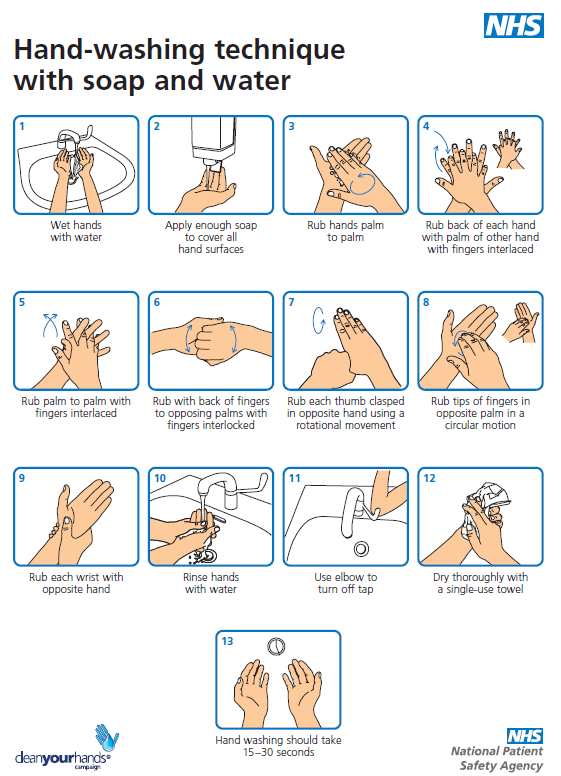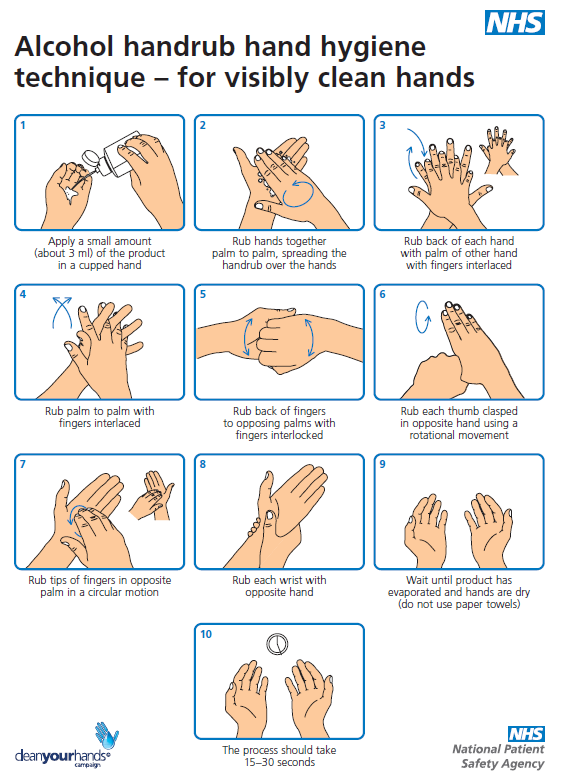- Reference Number: HEY1019/2020
- Departments: Neonates
- Last Updated: 20 November 2020
Handwashing techniques for Parents and Visitors on the Neonatal Unit
Introduction
This leaflet has been produced to give you general information about handwashing techniques. Most of your questions should be answered by this leaflet. It is not intended to replace the discussion between you and the healthcare team, but may act as a starting point for discussion. If after reading it you have any concerns or require further explanation, please discuss this with a member of the healthcare team.
Why is handwashing important?
Babies on the Neonatal Unit (NICU) are very vulnerable to infection. By washing your hands, you can remove bacteria and viruses, which might be unsafe for your baby.
Types of hand hygiene
Hand Washing:
Frequent hand washing with soap and water for 20 seconds is the most effective way of cleaning your hands in the hospital. This is sufficient for general social contact and most clinical care activities. Hand washing can be used to maintain personal hygiene and should always be used when hands are visibly dirty.
Hand Sanitiser
This is a quick, convenient and alternative to hand washing for already physically clean hands which are not visibly contaminated with dirt or organic material, especially when soap and water for hand washing is not readily available.
Hand washing sinks or hand sanitiser dispensers are located at the entrances to and throughout the Neonatal unit. Hand sanitizing dispensers are situated at strategic locations within the unit.
When should I wash my hands?
Prior to entering the Neonatal Unit, this will help to reduce germs being carried into the unit from outside, once you enter the clinical areas where your baby is, during your stay & when you leave the unit; this helps to prevent germs being carried to other areas of the Women`s & Children`s hospital.
Whilst in the neonatal unit you must wash your hands:
- Before and after you touch your baby.
- After every nappy change.
- Before and after expressing breast milk.
- Before and after preparing the feed for your baby.
- Each time you leave the Nursery room.
- Before you leave the Neonatal Unit.
Is there a ‘right’ way to wash my hands?
Yes. Please follow these steps to effectively wash your hands:
- Take off your outdoor coat and hang it on the hooks on the left hand side as you enter the Neonatal Unit (keep your valuables with you or use a locker).
- Roll up your sleeves and remove any watch, bracelets and rings. Keep them securely with you in your pocket or bag until you leave the Neonatal Unit.
- Wet your hands.
- Apply soap from the dispenser and wash your hands, wrists and lower arms following the instructions in the diagrams below. Turn the tap off using your elbow.
- Dry your hands, wrists and lower arms using the paper towels provided.
- Finally, apply the hand sanitiser provided in the dispenser, using the same technique as when washing your hands. It will dry in a few seconds.
Moisturiser
Using a non-perfumed hand moisturiser will protect your hands from any drying effects of hand cleansing.
Mobile phones
Mobile phones have been found to be a significant source of all bacteria and viruses. Please help by using the wipes in white tubs (PDI) which are suitable for cleaning phones and other electronic devices. Remember to wash/gel your hands after handling your phone and before touching your baby.
Should you require further advice on the issues contained in this leaflet, please do not hesitate to contact the Infection Prevention and Control Team on telephone HRI: (01482) 674869 or CHH: (01482) 623066


General Advice and Consent
Most of your questions should have been answered by this leaflet, but remember that this is only a starting point for discussion with the healthcare team.
Consent to treatment
Before any doctor, nurse or therapist examines or treats your child, they must seek your consent or permission. In order to make a decision, you need to have information from health professionals about the treatment or investigation which is being offered to your child. You should always ask them more questions if you do not understand or if you want more information.
The information you receive should be about your child’s condition, the alternatives available for your child, and whether it carries risks as well as the benefits. What is important is that your consent is genuine or valid. That means:
- you must be able to give your consent
- you must be given enough information to enable you to make a decision
- you must be acting under your own free will and not under the strong influence of another person
Information about your child
We collect and use your child’s information to provide your child with care and treatment. As part of your child’s care, information about your child will be shared between members of a healthcare team, some of whom you may not meet. Your child’s information may also be used to help train staff, to check the quality of our care, to manage and plan the health service, and to help with research. Wherever possible we use anonymous data.
We may pass on relevant information to other health organisations that provide your child with care. All information is treated as strictly confidential and is not given to anyone who does not need it. If you have any concerns please ask your child’s doctor, or the person caring for your child.
Under the General Data Protection Regulation and the Data Protection Act 2018 we are responsible for maintaining the confidentiality of any information we hold about your child. For further information visit the following page: Confidential Information about You.
If you need information about your child’s (or a child you care for) health and wellbeing and their care and treatment in a different format, such as large print, braille or audio, due to disability, impairment or sensory loss, please advise a member of staff and this can be arranged.
Your newborn baby’s NHS number
An NHS number is allocated to everyone whose birth is registered with a Registrar of Births and Deaths in England and Wales. You already have an NHS number and your baby will be assigned an NHS number soon after birth. Your NHS number is unique to you and provides a reliable means of linking you to the medical and administrative information we hold about you. NHS numbers are allocated on a random basis and, in themselves, provide no information about the people to whom they relate.
